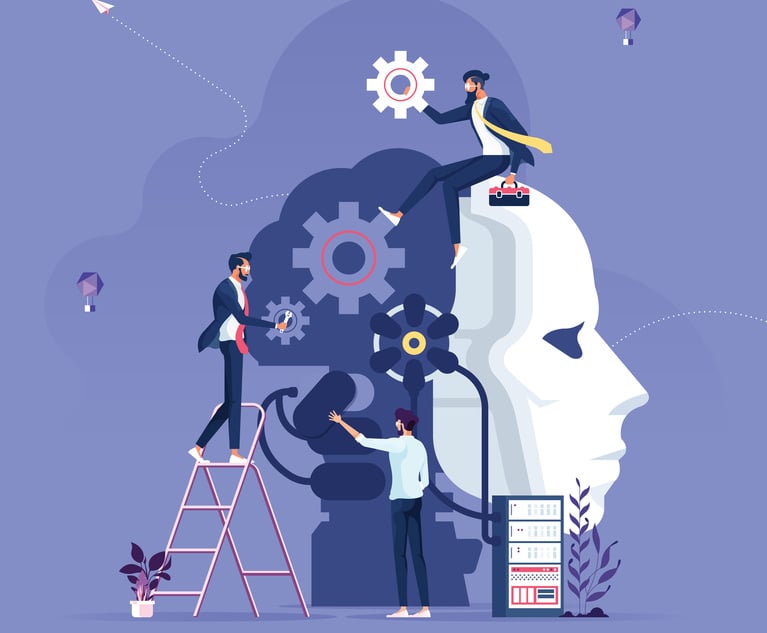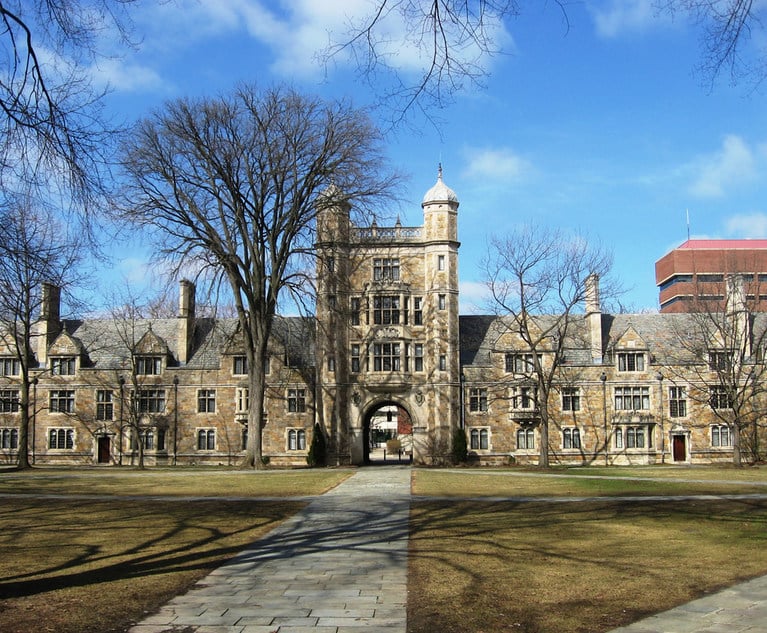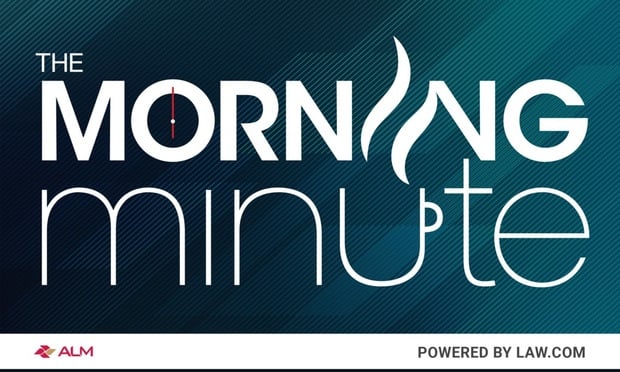Why More Millennials Are Going Solo | As Law Firms Continue to Cut Staff, Where Is the Line? | Honeywell Sued Over COVID-Related Marketing Claims: The Morning Minute
The news and analysis you need to start your day.
April 06, 2021 at 06:00 AM
5 minute read
Want to get this daily news briefing by email? Here's the sign-up.
WHAT WE'RE WATCHING
SOLO MISSIONS - Decades of client building and dues paying used to be a prerequisite for successfully making the leap from Big Law to a solo practice. But a growing number of millennial lawyers are skipping that step and just going for it, spurred by a desire to navigate their careers according to their personal values, Law.com's Meredith Hobbs reports. "I really want to use my legal skills to do more than help uber-rich companies with their bottom line and reducing their legal risk," said Alina Lee, who has started her own firm, Your Ad Attorney, at age 30 after working in Big Law and then in-house at a corporate legal department. "That's where the money is, but there is so much more to life." And for those young lawyers looking to hang their own shingles, the barriers to entry are lower than ever—in fact, there's no longer any actual shingle-hanging required. "You had to buy servers, a phone system—and you had to have a fancy office downtown with a Peachtree Street address. That is what it meant to have a firm," said Stephanie Everett, who left a big Atlanta firm in 2007 to co-found her own firm and now coaches small firm lawyers at Lawyerist. "Now the young lawyers I work with all work from home with just a computer and a few cloud-based subscriptions."
AUTOMATIC OR THE PEOPLE - The reality of remote work as a staple of the legal industry has spurred firms to take a close look at eliminating administrative staff positions that could theoretically be replicated with technology, but how much is too much when it comes to these types of cuts? While many firms have reported that their attorneys have adapted surprisingly well to their newfound autonomy, there is likely a limit to how much nonbillable work lawyers will accept, and for how long. In addition, as firms increasingly turn to software to help supplant portions of their administrative payrolls, it raises questions about much of the human element and personal touch provided by traditional law firm staff can be stripped out before more is lost than saved. As we examine in this week's Law.com Trendspotter column, we may not know where the line is until it's crossed. I'm interested to hear from you: where is the line when it comes to law firms leveraging technology at the expense of human jobs? Which tasks require a "human touch" and which don't? And as the pandemic fades, will lawyers continue to accept the burden of nonbillable administrative work? Let me know your thoughts at [email protected].
DISPENSING WITH THE NICETIES - Honeywell International was sued Monday in California Central District Court. The lawsuit, filed by Quinn Emanuel Urquhart & Sullivan on behalf of Moldex-Metric Inc, brings false advertising claims in connection with promoting an "anti-microbial protected" earplug dispenser as beneficial for human health during the COVID-19 pandemic. "Honeywell's sales and marketing statements for the HL400-AM Antimicrobial-Protected Dispenser include numerous public health claims notwithstanding that the product is neither approved and registered by the EPA, nor covered by any exemption to registration," the lawsuit alleges. Counsel have not yet appeared for the defendant. The case is 2:21-cv-02911, Moldex-Metric, Inc. v. Honeywell, Inc. Stay up on the latest deals and litigation with the new Law.com Radar.
EDITOR'S PICKS
NOT FOR REPRINT
© 2025 ALM Global, LLC, All Rights Reserved. Request academic re-use from www.copyright.com. All other uses, submit a request to [email protected]. For more information visit Asset & Logo Licensing.
You Might Like
View All

From Laggards to Tech Founders: Law Firm Innovation Is Flourishing

Inside Track: Cooley's Modest Proposal to Make Executives Safer

Law School Applications are Up Across the Country. Law Deans Aren't Sure Why
6 minute readLaw Firms Mentioned
Trending Stories
- 1States Accuse Trump of Thwarting Court's Funding Restoration Order
- 2Microsoft Becomes Latest Tech Company to Face Claims of Stealing Marketing Commissions From Influencers
- 3Coral Gables Attorney Busted for Stalking Lawyer
- 4Trump's DOJ Delays Releasing Jan. 6 FBI Agents List Under Consent Order
- 5Securities Report Says That 2024 Settlements Passed a Total of $5.2B
Who Got The Work
J. Brugh Lower of Gibbons has entered an appearance for industrial equipment supplier Devco Corporation in a pending trademark infringement lawsuit. The suit, accusing the defendant of selling knock-off Graco products, was filed Dec. 18 in New Jersey District Court by Rivkin Radler on behalf of Graco Inc. and Graco Minnesota. The case, assigned to U.S. District Judge Zahid N. Quraishi, is 3:24-cv-11294, Graco Inc. et al v. Devco Corporation.
Who Got The Work
Rebecca Maller-Stein and Kent A. Yalowitz of Arnold & Porter Kaye Scholer have entered their appearances for Hanaco Venture Capital and its executives, Lior Prosor and David Frankel, in a pending securities lawsuit. The action, filed on Dec. 24 in New York Southern District Court by Zell, Aron & Co. on behalf of Goldeneye Advisors, accuses the defendants of negligently and fraudulently managing the plaintiff's $1 million investment. The case, assigned to U.S. District Judge Vernon S. Broderick, is 1:24-cv-09918, Goldeneye Advisors, LLC v. Hanaco Venture Capital, Ltd. et al.
Who Got The Work
Attorneys from A&O Shearman has stepped in as defense counsel for Toronto-Dominion Bank and other defendants in a pending securities class action. The suit, filed Dec. 11 in New York Southern District Court by Bleichmar Fonti & Auld, accuses the defendants of concealing the bank's 'pervasive' deficiencies in regards to its compliance with the Bank Secrecy Act and the quality of its anti-money laundering controls. The case, assigned to U.S. District Judge Arun Subramanian, is 1:24-cv-09445, Gonzalez v. The Toronto-Dominion Bank et al.
Who Got The Work
Crown Castle International, a Pennsylvania company providing shared communications infrastructure, has turned to Luke D. Wolf of Gordon Rees Scully Mansukhani to fend off a pending breach-of-contract lawsuit. The court action, filed Nov. 25 in Michigan Eastern District Court by Hooper Hathaway PC on behalf of The Town Residences LLC, accuses Crown Castle of failing to transfer approximately $30,000 in utility payments from T-Mobile in breach of a roof-top lease and assignment agreement. The case, assigned to U.S. District Judge Susan K. Declercq, is 2:24-cv-13131, The Town Residences LLC v. T-Mobile US, Inc. et al.
Who Got The Work
Wilfred P. Coronato and Daniel M. Schwartz of McCarter & English have stepped in as defense counsel to Electrolux Home Products Inc. in a pending product liability lawsuit. The court action, filed Nov. 26 in New York Eastern District Court by Poulos Lopiccolo PC and Nagel Rice LLP on behalf of David Stern, alleges that the defendant's refrigerators’ drawers and shelving repeatedly break and fall apart within months after purchase. The case, assigned to U.S. District Judge Joan M. Azrack, is 2:24-cv-08204, Stern v. Electrolux Home Products, Inc.
Featured Firms
Law Offices of Gary Martin Hays & Associates, P.C.
(470) 294-1674
Law Offices of Mark E. Salomone
(857) 444-6468
Smith & Hassler
(713) 739-1250









